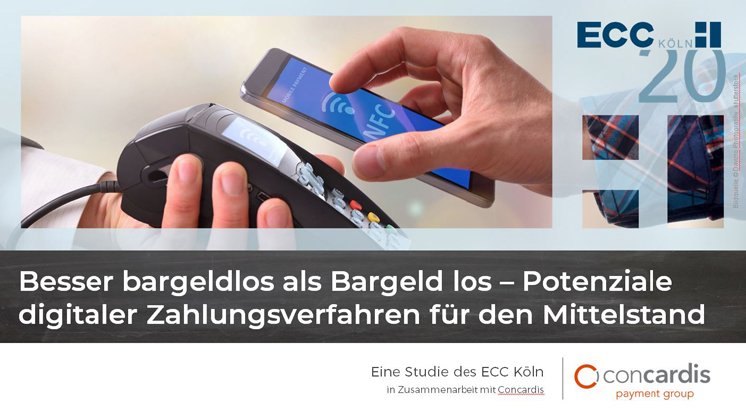- Study by ECC Köln and Concardis: 53% of SMEs have experienced positive effects on sales from cashless payments
- Time spent for cash processing in the back office 45% higher than for cashless payment methods
- Contactless payments with card in Germany on the rise; mobile payment still waiting for take-off
- More than half of customers prefer exclusively cashless payment – that figure rises to 70% amongst smart consumers
Sales and cost-saving potential for SMEs
The study demonstrates the positive effect of cashless payments on key performance indicators: More than half of the businesses surveyed indicate that they have seen a positive effect from cashless payments on sales (53%) and the share of new customers (51%). Around half of customers (49%) pay more attention to prices when they can pay only with cash; customers tend to have higher bills if card payments are accepted. Of the businesses surveyed, 43% report an increase in bill size and shopping basket amounts through cashless payments.
Accepting cashless payments also offers significant increases in efficiency for businesses: Settling cash payments in the back office takes on average 29 minutes and thus approx. 45% longer than the handling of cashless payments. Three-fourths of SMEs need less than 20 minutes a day processing digital payments. This time saved in downstream processes results in additional savings potentials for retailers, restaurateurs and hotel operators. Also during checkout, contactless payment offers particularly fast processing: More than half of the SMEs surveyed (52%) report that contactless payments take less time to carry out than cash payments.
‘The results of our study show the positive effect of accepting cashless payments on sales and on efficiency – an important finding, especially for small and mid-sized companies,’ says Robert Hoffmann, CEO of Concardis. ‘With simple and innovative payment solutions and without large investments, retailers and service providers can increase their business potential and make their company fit for the future. Accepting card payments with the option of contactless payment is a minimum requirement for this. The potential of mobile payments in particular will continue to develop in the coming years. Businesses should get on board at an early stage to take advantage of these developments.’
Contactless payments on the rise – Mobile payments still less important
Contactless payments are facilitating the trend towards cashless payments and are becoming increasingly established at the POS for SMEs. Nearly one-third (30%) of customers surveyed already use their card to make contactless payments regularly – amongst smart consumers, the particularly technology- and smartphone-savvy users, this figure is even higher, coming in at 41%. Although cash is still popular for amounts of less than €50, the willingness to make contactless payments is significant – regardless of the amount of the bill. Mobile payments are making a comparatively slower rise: Only 5% of customers regularly use smartphone-based payment methods at the POS. This figure reaches already 10% amongst smart consumers. Overall, customers’ payment behavior is clearly heading in the direction of card payments. Every second person surveyed (49%) indicates that they would make cashless payments (much) more frequently in the future. Today 70% of smart consumers already prefer exclusively cashless payment.
‘Smart consumers are the relevant target group when retailers, restaurateurs and hotel operators look to the future. They show which payment methods are going to be more prevalent in retail in the future. Anyone who wants to cater to this group has to adapt to their purchasing and payment behavior and must offer them modern cashless payment options,’ remarks Mailin Schmelter, deputy head of Customer Insights at ECC Köln.
About the study
For the study titled ‘Besser bargeldlos als Bargeld los – Potenziale digitaler Zahlungsverfahren im Mittelstand’, ECC Köln and Concardis teamed up to survey 300 German businesses from the retail, gastronomy and hotel sectors between February and March 2019. Additionally, a survey of 1,000 customers was carried out in March and April 2019. The study is representative and examines the status quo of customers’ payment behavior at the POS and the effects of digital payment methods on SMEs in Germany and, in this context, identifies the potential that results for businesses.
The study is publicly available here: https://www.concardis.com/newsletter.
About ECC Köln
Embedded within IFH Köln, ECC Köln is the first contact for trends and developments in the world of digital retail. Retailers, manufacturers and service providers benefit from unique market and customer insights as well as from individual market research and strategic consulting. With the ECC Club (www.ecc-club.de), ECC Köln offers a one-of-a-kind platform for content and networking for decision makers from the world of e-commerce. Content. Commerce. ONE Community – that’s what ECC Köln stands for.More at: www.ecckoeln.de
Data from this press release may only be used for journalistic or editorial purposes. Any use for advertising or commercial purposes, as well as processing for contract-based remarketing, is prohibited. This applies to statistics portals in particular.
Source: ECC Köln/Concardis, 2019

